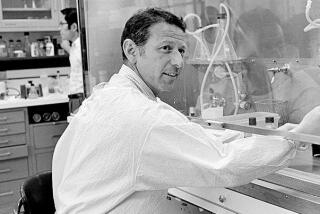Joseph Burg, 80; Helped Found Machine-Tool Firm
- Share via
Joseph L. Burg, an entrepreneur and co-founder of Burgmaster Corp., a company whose machines helped speed manufacturing in the 1950s, died Saturday of a rare blood disease at Cedars-Sinai Medical Center. He was 80.
The company, started in 1944 in a Hollywood garage by Burg’s father, Fred, was the largest machine-tool manufacturer west of the Mississippi in the 1960s. A takeover target in the 1980s, it became a symbol of American industrial distress after it was profiled in the 1989 book “When the Machine Stopped” by historian and journalist Max Holland.
Burg’s father was an inventor best known for developing the Burgmaster turret drill, a labor-saving device that was seen as a major engineering advance in the 1950s.
Capable of doing the work of several drilling machines at once, it became part of a revolutionary equation in manufacturing when it was one of the first machines to be run by computer in the late 1950s. A Burgmaster turret drill is part of the Smithsonian Institution collection.
Burg and his brother-in-law, Norman Ginsburg, were made partners in the company when they were discharged from the Army in 1945. While Ginsburg handled production, Burg concentrated on sales, a tough job for a company seen as an upstart by the more established machine-tool manufacturers centered in the Midwest and East.
Burg became known as “Mr. Outside,” aggressively promoting the ability of the company to build the machines its customers needed.
“He was a great salesman,” said Holland, whose father worked for Burgmaster for 29 years. “He promised a lot of things that pushed the company to greater achievements.”
Burg was born in Chicago, where his Czech immigrant father managed a department store. His father preferred to work with machines and in 1943, attracted by California’s expanding economy, moved the family to Los Angeles. He began drafting designs in his garage, and soon had a patent for a tool-holding device called the Tool-Flex, the first successful product sold by his company.
The firm prospered through the 1950s, and opened a plant in Gardena. Joe Burg headed sales and engineering, eventually becoming company president when his father retired.
With net sales of $6 million by the early 1960s, Burgmaster began to attract suitors. In 1965, it was sold to Houdaille Industries, a company built on its success in the auto parts business. Houdaille quickly marginalized Burgmaster’s founders and replaced its family-style management.
Burg was pushed out as president, and served briefly as vice president for international sales in the Houdaille organization before finally leaving in 1970 when, according to Holland, he could no longer tolerate Houdaille’s “narrow emphasis on the bottom line.”
Houdaille became the target of a leveraged buyout in 1979 by the Wall Street firm of Kohlberg, Kravis, Roberts. The pressure to pay off the cash debt created by what was then a record buyout was the death knell for Burgmaster. It was closed in 1986.
Burg later joined forces with another former Burgmaster employee to found Essay International, based in Elk Grove Village, Ill., which imported and distributed machine tools from England and Spain.
He also was a principal investor in Centurion Savings & Loan, which had six branches in Southern California before it was sold for $6.5 million to Atlantic Financial in 1987. With his son, Randall, he founded Popcal Inc., an operator of Popeye’s Fried Chicken restaurants in Los Angeles.
His philanthropy benefited the City of Hope, Cedars-Sinai Medical Center and other organizations.
Burg inherited his father’s penchant for inventing. Until a few weeks before his death, he was working on a design for a lifting system that would help people in wheelchairs have more independence.
In addition to his son, Burg is survived by his wife, Francine; daughters Cindy and Bobbi; 12 grandchildren; and two great-grandchildren.
More to Read
Inside the business of entertainment
The Wide Shot brings you news, analysis and insights on everything from streaming wars to production — and what it all means for the future.
You may occasionally receive promotional content from the Los Angeles Times.









